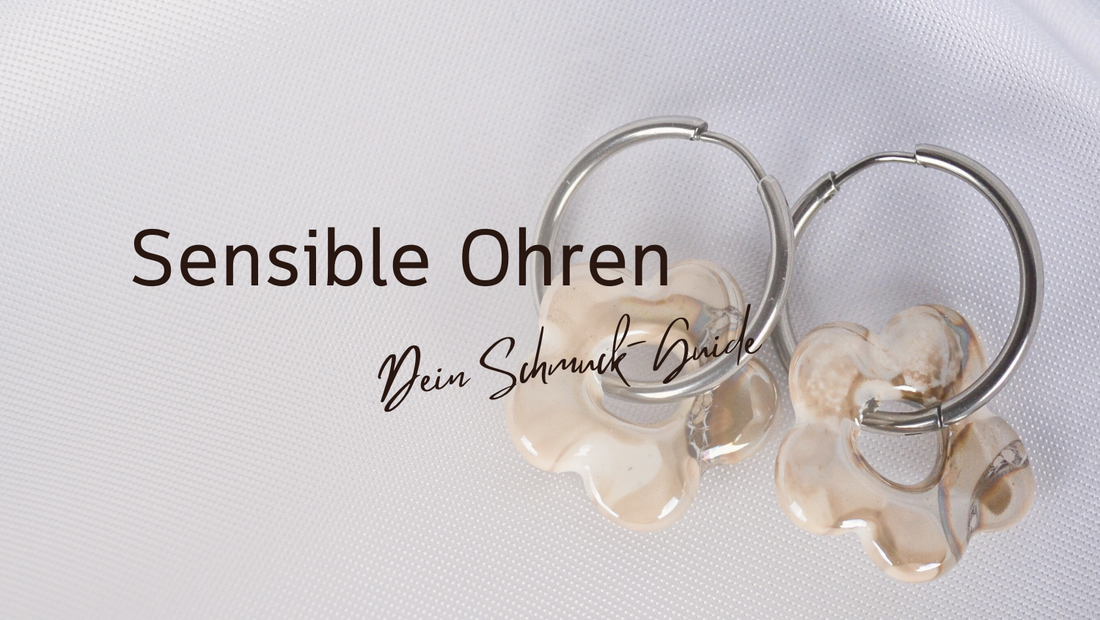
Sensitive Ears: Your Jewelry Guide
Share
This is how you can wear jewelry with sensitive ears!
A large portion of the population is familiar with it: nickel allergy. It makes wearing (fashion) jewelry difficult, and finding the right materials time-consuming and expensive.
But it is not only the nickel allergy that needs to be taken into account when wearing jewelry, because there are also people who are allergic to UV resin and other substances can trigger reactions due to intolerances or allergies.
In this article, we explain which materials you need to be careful with, what is best suited for sensitive ears and skin, and debunk the myth surrounding gold and silver jewelry.
Possible triggers
1. Nickel
Nickel is one of the most common triggers of contact allergies. It is often used in jewelry alloys because it is inexpensive and corrosion-resistant.
Typical reactions include redness, itching, rashes, eczema and blistering at the contact site.
In people allergic to nickel, the material triggers an immune reaction in which the immune system recognizes nickel as a foreign substance. This leads to an inflammatory reaction in the skin.
Stainless steel is generally considered a safe option and a replacement for nickel, although it can contain up to 10% nickel as an alloy. We'll explain why this is the case in the next blog post!
2. UV resin
UV resin is a popular option, especially for handmade jewelry, to seal the surface of the creations and create a wonderful shine and durability. We also use UV resin for some of our earrings, as it's the best way to seal certain surface materials, such as the "Sparkling Ocean" version of Gaia .
Resins may contain chemicals that can cause allergic reactions in some people. Itching, redness, and swelling are the most common symptoms when skin comes into contact with UV resin. However, this intolerance is less common than nickel allergy/intolerance.
3. Cobalt
Cobalt is also used in jewelry alloys, especially in combination with nickel, to increase hardness. Itchy skin rashes and redness are common, but more severe contact dermatitis can also occur.
Similar to nickel, the immune system can react to cobalt, resulting in an allergic skin reaction.
You can specifically search for jewelry that is declared cobalt and nickel free.
4. Lead and cadmium
Some low-quality jewelry, especially costume jewelry, may contain lead or cadmium. These metals can cause skin rashes, itching, and, in extreme cases, even severe toxic reactions upon prolonged contact.
These heavy metals can enter the body through skin contact and cause an inflammatory reaction or toxic reactions.
5. Iron and iron alloys
Iron in jewelry can cause skin irritation in some people. Redness, itching, and rashes are common.
Iron can oxidize when in contact with moisture, leaving iron oxides (rust) on the skin, which causes skin irritation.
Materials that are safer for allergy sufferers and sensitive skin
- Titanium: Titanium is a lightweight, strong, and hypoallergenic material, making it ideal for people with sensitive skin. It contains no metals such as nickel and generally doesn't cause allergic reactions.
- Surgical steel (316L): Surgical steel is often used for medical implants and is therefore also hypoallergenic. It contains a very small amount of nickel that generally does not cause allergies, making it a popular choice for jewelry.
- Platinum: Platinum is a heavy but very pure metal that doesn't cause allergic reactions because it's naturally hypoallergenic. 950 platinum jewelry is therefore a safe choice for allergy sufferers.
- Palladium: Palladium is also a member of the platinum group and is often used as an alternative to platinum. It is hypoallergenic and can be an excellent choice for allergy sufferers.
- Pure gold (24 karat): If you're looking for real gold, 24 karat gold is the safest choice because it contains no nickel. However, it's softer and may be less suitable for jewelry that's subject to heavy wear and tear.
→ If you're looking for a piece of jewelry in a specific metal, feel free to contact us, and we'll try to find the perfect solution for you! Simply send us an email to: shop@linatistudio.com
Myth of gold and silver jewelry
We often hear at craft markets that people are allergic to nickel and therefore cannot wear jewelry or can only wear silver or gold.
We will briefly explain to you why this is not always entirely true:
- Silver: Although silver is considered less allergenic, it is usually alloyed with other metals such as copper, zinc, or nickel. This can cause silver rings, earrings, or necklaces to trigger allergic reactions. Sterling silver (925 silver, a silver alloy consisting of 92.5% pure silver) in particular often contains a small amount of nickel, which can cause reactions in sensitive individuals.
- Gold: Gold is also rarely used in its purest form. 18-karat gold (75% gold content) also contains other metals such as copper and nickel. Nickel is often added, especially to white gold , to enhance the color, which can be problematic for people with nickel allergies.
Conclusion
If you're willing to spend a lot of money, you can always go for pure silver or pure gold. However, you can also avoid this by choosing cheaper materials like stainless steel.
Discover our unique jewelry now and find your next favorite piece at Linati Studio!

